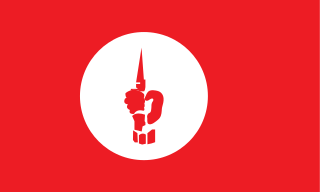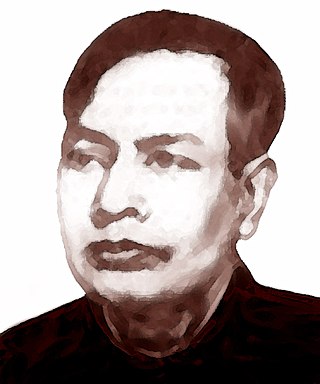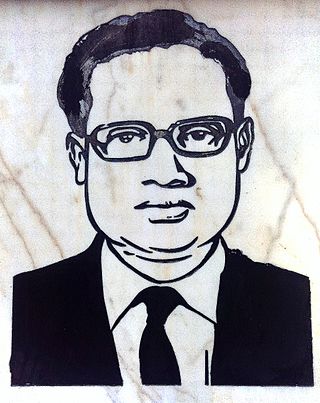
Syed Nazrul Islam was a Bangladeshi politician and a senior leader of the Awami League. During the Bangladesh Liberation War, he was declared as the Vice President of Bangladesh by the Provisional Government. He served as the Acting President in the absence of Sheikh Mujibur Rahman.

Ghulam Azam was a Bangladeshi politician. He served as the Ameer of the Bangladesh Jamaat-e-Islami.

Mohammad Ataul Gani Osmani was a Bangladeshi military officer and revolutionary. His military career spanned three decades, beginning with his service in the British Indian Army in 1939. He fought in the Burma Campaign during World War II, and after the partition of India in 1947, he joined the Pakistan Army and served in the East Bengal Regiment, retiring as a colonel in 1967. Osmani joined the Provisional Government of Bangladesh in 1971 as the commander-in-chief of the nascent Bangladesh Forces. Regarded as the founder of the Bangladesh Armed Forces, Osmani retired as the first full general from the Bangladesh Army in 1972.

Bogra District, officially Bogura District is a district in the northern part of Bangladesh, in the Rajshahi Division. Bogra is an industrial city where many small and mid-sized companies are sited. Bogra was a part of the Pundravardhana territory of ancient Bengal and the ruins of its capital can be found in northern Bogra. Bogra is named after the independent sultan of Bengal Nasiruddin Bughra Khan (1287–1291).
The Razakar were a gendarmerie and paramilitary force in East Pakistan organised by General Tikka Khan in 1971. They were organised as a counter-insurgency force to fight Mukti Bahini guerrillas in the Bangladesh Liberation War, and played an infamous role in the Bangladesh genocide. The Razakars were disbanded following Pakistan's defeat and surrender in the 1971 Indo-Pakistani War.
The Al-Badr was a collaborationist paramilitary force composed mainly of pro-Pakistan people, which operated in East Pakistan against the Bengali nationalist movement during the Bangladesh War of Independence, under the patronage of the Government of Pakistan.
The Al-Shams was a collaborationist paramilitary wing allied with several Islamist parties in East Pakistan, comprising both local Bengalis and Muhajirs. Alongside the Pakistan Army and Al-Badr, Al-Shams has been accused of participating in widespread atrocities against Bengali nationalists, civilians, and religious and ethnic minorities during the 1971 war. Following the war, the government of Bangladesh officially banned the group.

In 1971, the Pakistan Army and their local collaborators, most notably the extreme right wing militia group Al-Badr, engaged in the systematic execution of Bengali intellectuals during the Bangladesh Liberation War of 1971. Bengali intellectuals were abducted, tortured and killed during the entire duration of the war as part of the Bangladesh genocide. However, the largest number of systematic executions took place on 25 March and 14 December 1971, two dates that bookend the conflict. 14 December is commemorated in Bangladesh as Martyred Intellectuals Day.
Sheikh Fazlul Haque Moni was a Bangladeshi politician. He was one of the nephews of Sheikh Mujibur Rahman, the founding father of Bangladesh. He was one of the founder of Mujib Bahini Bangladesh Liberation Force-BLF one of the major guerrilla forces of the Bangladesh Liberation War and also the founder of Bangladesh Awami Jubo League, the youth wing of Bangladesh Awami League.

Bangladesh's military history is intertwined with the history of a larger region, including present-day India, Pakistan, Nepal, Bhutan and Myanmar. The country was historically part of Bengal – a major power in South Asia and Southeast Asia.

1971 Dhaka University massacre was the mass murder of students and faculty at the University of Dhaka in East Pakistan by the Pakistan Army, at the beginning of what would become the Bangladesh War of Independence. In March 1971, the Pakistan Army Eastern Wing Commander Tikka Khan launched Operation Searchlight on the orders of Yahya Khan to crush the Bengali nationalist movement. As part of the operation, the army launched an assault on the university campus. It is the deadliest attack on a university in history.

The Mukti Bahini, also known as the Bangladesh Forces, was a big tent armed guerrilla resistance movement consisting of the Bangladeshi military personnel, paramilitary personnel and civilians during the Bangladesh Liberation War that transformed East Pakistan into Bangladesh in 1971. They were initially called the Mukti Fauj.
Z Force, also known as the Tura Brigade, was the first military brigade of Bangladesh Forces, formed during the Liberation War of Bangladesh in 1971 under Major Ziaur Rahman along with the consent of the revolutionary government of Bangladesh in exile. The brigade was formed with the 1st, 3rd and 8th Battalion of East Bengal Regiment on 7 July 1971. It is the first ever complete brigade formed during the Liberation War of Bangladesh in 1971.

Mohammad Martuza was a Bengali physician, who was killed during the 1971 liberation war of Bangladesh. He is considered a martyr in Bangladesh.
Nizam Mohammad Serajul Alam Khan, commonly known as Serajul Alam Khan, also called as Dada, Dadabhai and by his initials SAK, was a Bangladeshi politician, political analyst, philosopher and writer who spearheaded the Bangladesh liberation movement under the leadership of Sheikh Mujibur Rahman but also became one of the controlling forces of political polarization in post-independence Bangladesh.

Kosiruddin Talukder (1899-1971) was a Pakistani medical doctor and politician who died in the Bangladesh Liberation war and is considered as martyr intellectual of 1971.

Shamsuddin Ahmed was an East Pakistan medical doctor who was killed in the Bangladesh Liberation war and considered a martyr in Bangladesh.
Muhammad Shafi (1915-1971) was a Bangladeshi surgeon who was killed in the Bangladesh Liberation war. Shafi is considered a "Martyr" in Bangladesh.
Ayesha Bedora Choudhury (1935–1971) was a Bangladeshi doctor who was killed in the Bangladesh Liberation war and is considered a martyr in Bangladesh.
A. J. M. Aminul Haque was a Bangladesh Army officer and veteran of the Bangladesh Liberation War. He was awarded the Bir Uttom, Bangladesh's second-highest military gallantry award. He was the commanding officer of the 8th East Bengal Regiment during the war and retired as a brigadier general from the Bangladesh Army.













